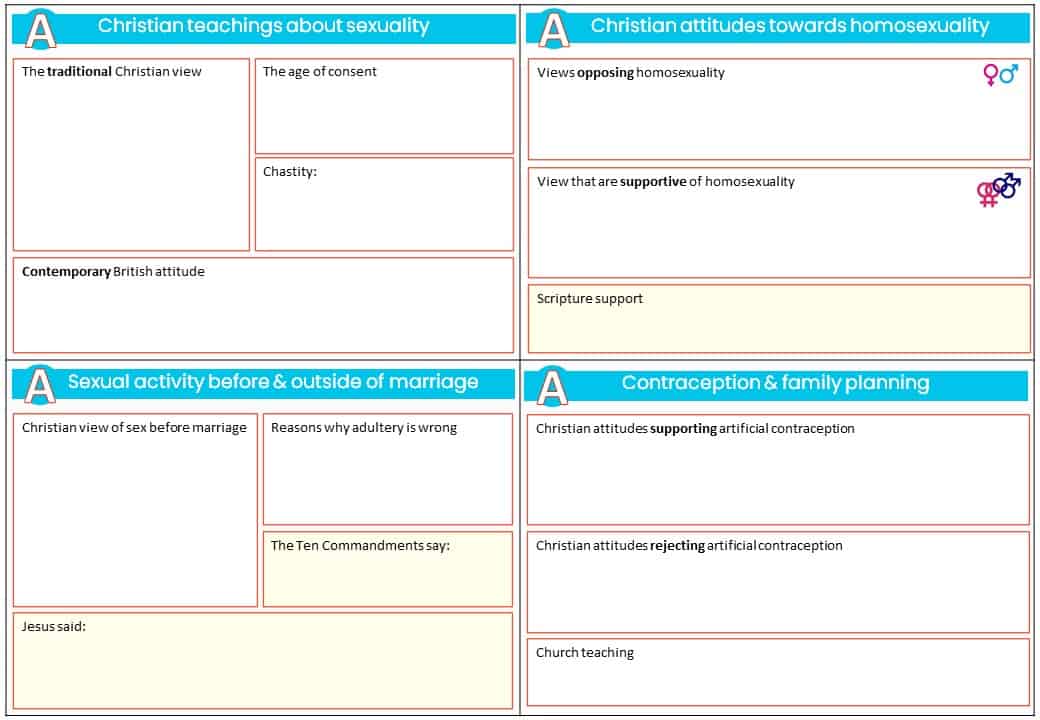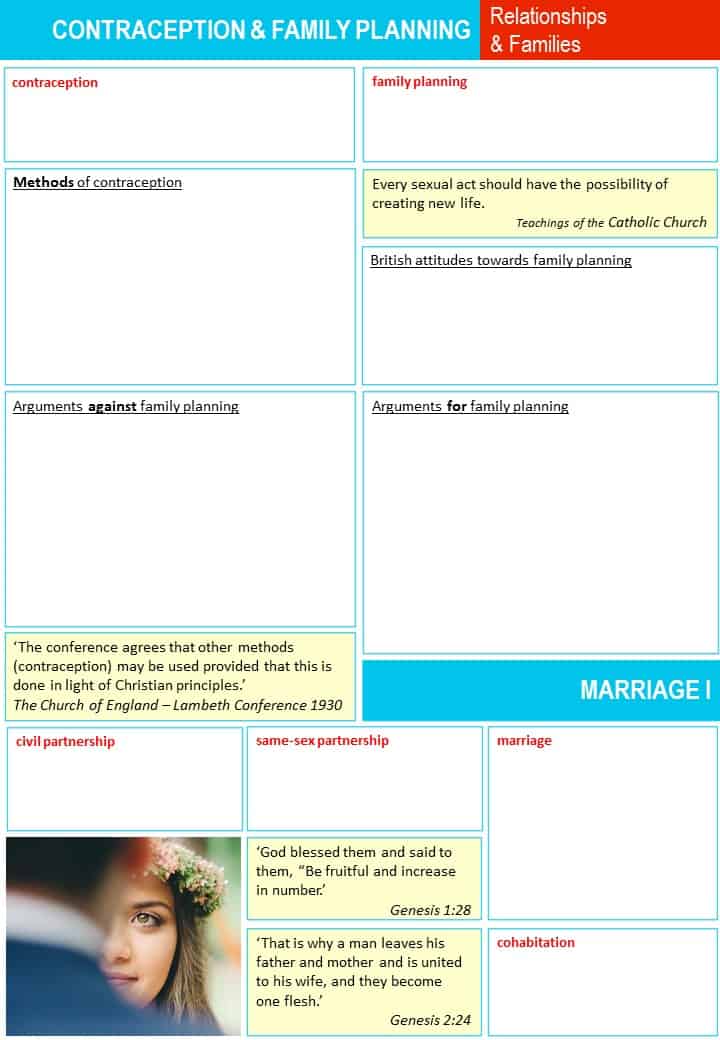Theme A
Relationships and families
Sex, marriage and divorce
- Contraception and family planning.
- The nature and purpose of marriage.
You must be able to explain contrasting beliefs on the following three issues with reference to Christianity and one or more other religious traditions.
Contraception & family planning
Explain two contrasting religious beliefs in contemporary British society about contraception. (2)
2022
- Generally a distinction is seen between natural contraception which works with the woman’s natural cycle and artificial contraception which, whilst more reliable than natural methods, is seen by some religious believers as going against natural law
- encouraging infidelity
- preventing the will of God / preventing people carrying out their religious duty
- most religions would see permanent contraception, ie sterilisation, as unacceptable unless a medical necessity, etc.
- Those who support the use of artificial contraception see it as a way of more reliably planning families / children are able to be planned making it easier for families to cope
- prevents the transmission of sexually transmitted infections
- prevents transmission of genetic disorders / so reduces suffering and pain
- may prevent the mother’s life from being put at risk, etc.
Christianity
- All denominations permit natural contraception however some (eg Roman Catholic and Orthodox) do not permit artificial forms of contraception seeing it as against natural law
- against the purpose of marriage / ‘Every sexual act should have the possibility of creating new life.’ (Humanae Vitae 1968)
- Many other Christians accept the use of artificial contraception in family planning for health, financial and other reasons
- seen as a matter of personal conscience
- some have reservations about the morning after pill considering it abortion rather than contraception
- Church of England approved the use of artificial contraception at the 1930 Lambeth Conference, ‘The Conference agrees other methods may be used, provided that this is done in the light of Christian principles.’
Judaism
- Contraception impedes the will of God
- a large family is a blessing from God / ‘Like arrows in the hands of a warrior are sons born in one’s youth. Blessed is the man whose quiver is full of them.’ (Psalm 127: 4&5)
- Orthodox Jews permit contraception if the mother’s life is at risk
- not acceptable for social or economic reasons or reasons of convenience
- use of the pill is preferred as it does not interfere with the sexual act or destroy semen
- sterilisation is forbidden as it damages the body created by God
- Reform and Progressive Jews accept contraception for social reasons, eg welfare of the family / financial reasons / to protect the mother’s mental or physical health / the couple is free to use contraception of their choice, etc.
Give two religious beliefs about the use of contraception. (2)
Spec 2
- Should not be used to prevent having children altogether can be used for spacing children
- economic reasons, eg prevent child being born into deprivation
- mother’s health
- welfare of other children
- allow couple to develop relationship before having children
- prevent STDs
- use of contraception considered wrong by some religions, eg purpose of marriage is procreation/ sex act should be open to possibility of conceiving a child
- God will not send more children than a couple can care for/should be acceptable only within marriage
Explain two contrasting religious beliefs in contemporary British society about contraception. (4)
2022
- Generally a distinction is seen between natural contraception which works with the woman’s natural cycle and artificial contraception which, whilst more reliable than natural methods, is seen by some religious believers as going against natural law / encouraging infidelity
- preventing the will of God / preventing people carrying out their religious duty
- most religions would see permanent contraception, ie sterilisation, as unacceptable unless a medical necessity, etc.
- Those who support the use of artificial contraception see it as a way of more reliably planning families / children are able to be planned making it easier for families to cope
- prevents the transmission of sexually transmitted infections
- prevents transmission of genetic disorders / so reduces suffering and pain
- may prevent the mother’s life from being put at risk
Christianity
- All denominations permit natural contraception however some (eg Roman Catholic and Orthodox) do not permit artificial forms of contraception seeing it as against natural law / against the purpose of marriage
- ‘Every sexual act should have the possibility of creating new life.’ (Humanae Vitae 1968)
- Many other Christians accept the use of artificial contraception in family planning for health, financial and other reasons
- seen as a matter of personal conscience / some have reservations about the morning after pill considering it abortion rather than contraception
- Church of England approved the use of artificial contraception at the 1930 Lambeth Conference, ‘The Conference agrees other methods may be used, provided that this is done in the light of Christian principles.’
Judaism
- Contraception impedes the will of God / a large family is a blessing from God / ‘Like arrows in the hands of a warrior are sons born in one’s youth. Blessed is the man whose quiver is full of them.’ (Psalm 127: 4&5)
- Orthodox Jews permit contraception if the mother’s life is at risk
- not acceptable for social or economic reasons / or reasons of convenience
- use of the pill is preferred as it does not interfere with the sexual act or destroy semen / sterilisation is forbidden as it damages the body created by God
- Reform and Progressive Jews accept contraception for social reasons, eg welfare of the family / financial reasons
- to protect the mother’s mental or physical health / the couple is free to use contraception of their choice, etc.
Explain two contrasting beliefs in contemporary British society about the use of artificial contraception within marriage. (4)
Spec 1
Christianity
- There are contrasting views within Christianity. Orthodox and Roman Catholics teach artificial contraception within marriage is wrong- against natural law and purpose of marriage; might encourage infidelity. Every sexual act should have the possibility of creating new life (Humanae Vitae, 1968).
- Other Christians accept its use in family planning for health, financial and other personal reasons. The Church of England approved the use of artificial contraception at the Lambeth Conference in 1930: ‘The Conference agrees that other methods may be used, provided that this is done in the light of Christian principles.’
Judaism
- A large family is a blessing from God, fulfilling God’s command to ‘be fruitful and increase in number’ (Genesis 1:28).
- Orthodox Jews only allow the use of artificial contraception within marriage if the mother’s health is at risk, and not for social or economic reasons.
- The pill is preferred as it does not destroy semen or interfere with the sexual act.
- Reform and Progressive Jews accept the use of artificial contraception for reasons of the mother’s mental or physical health or the welfare of the rest of the family
The nature and purpose of marriage
Explain two religious beliefs about sexual relationships outside of marriage (adultery). (5)
Spec 2
- In general, all religions oppose sex outside marriage (adultery) because
it is a betrayal of trust/breaks marriage vows - cause pain to all including children
- is selfish
- irresponsible
- dishonest
- involves secrecy and lies
- goes against the nature and purpose of marriage, etc.
Christianity
- Adultery breaks marriage vows made before God at the wedding
- threatens the whole purpose of marriage
- threatens security of any children
- against the commandment ‘Do not commit adultery.’ (Exodus 20:14)
- against Jesus’ teaching: ‘You have heard that it was said, ‘Do not commit adultery.’ But I tell you that anyone who looks at a woman lustfully has already committed adultery with her in his heart.’ (Matthew 5:27–8), etc.
Judaism
- The Torah teaches ‘Do not commit adultery’
- ‘You shall not covet your neighbour’s wife’ (Exodus 20:14 and 17)
- in ancient times penalty of death
- marriage promises broken
- breaks the spiritual bond of marriage
- destroys family life
- considered so wrong that Jewish law requires a man whose wife has been unfaithful to him to divorce her even if he is willing to forgive her, etc.
Explain two contrasting religious beliefs about the nature of marriage. (4)
2021
- Most religions teach that marriage is intended as a faithful / long-term commitment / for the sharing of love / companionship / raising of children, etc.
Christianity
- Marriage is a gift from God at creation
- part of natural law
- life-long union blessed by God
- reflects the sacrificial love of Jesus
- it is a covenant before God
- couple promise to live faithfully until death
- it is a spiritual bond of trust that reflects the love of God for the Church
- within some branches of Christianity it is a sacrament
- ‘That is why a man leaves his father and mother and is united to his wife and they become one flesh’ (Genesis 2:24), etc.
Judaism
- Marriage not just a social contract
- it is the spiritual binding together of a man and woman in love
- in a life-long commitment to each other
- part of God’s plan at creation,‘That is why a man leaves his father and mother and is united to his wife and they become one flesh.’ (Genesis 2:24)
- ews see their partner as their soulmate
- marriage shows the love of God for his people of Israel / covenant relationship


